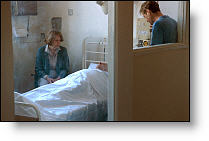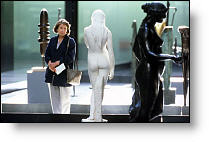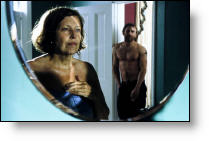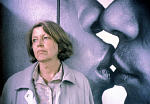The Mother
 for sexual content including graphic images of sexuality, language and brief drug use.
for sexual content including graphic images of sexuality, language and brief drug use.
Reviewed by: Chris Monroe
STAFF WRITER
| Moral Rating: | Extremely Offensive |
| Moviemaking Quality: |
|
| Primary Audience: | Adults |
| Genre: | Drama |
| Length: | 1 hr. 52 min. |
| Year of Release: | 2004 |
| USA Release: |
May 28, 2004 |






Learn how to make your love the best it can be. Christian answers to questions about sex, marriage, sexual addictions, and more. Valuable resources for Christian couples, singles and pastors.
| Featuring |
|---|
| Daniel Craig, Peter Vaughan, Anne Reid, Steven Mackintosh, Cathryn Bradshaw |
| Director |
|
Roger Michell |
| Producer |
| Stephen Evans, David M. Thompson, Kevin Loader |
| Distributor |
Stuck in an unfamiliar city far from home, May fears that she has become another invisible old lady whose life is more or less over. Until she falls for Darren, a man half her age who is renovating her son’s house and sleeping with her daughter.”
Perhaps it can “take a lifetime to feel alive” (as the tagline states)—but it certainly doesn’t have to. Detailing the life and character of “The Mother” is perhaps an honest depiction of a woman’s experience, but it offers no hope and no encouragement for how life could be. It raises questions and presents a search for life’s meaning, but can leave one feeling empty, without answers and without truth.
Having lived a conventional and seemingly normal life, May (Anne Reid) and her husband visit their two children and three grandchildren in London shortly before her husband passes away. After an understandably depressing return home, May argues with her son, Bobby (Steven Mackintosh), until he decides to let her come live with him and his unstable family. While her family is consumed with their own interests, May’s life becomes disenfranchised, and before long she has an affair with a married man, Darren (Daniel Craig)—a friend of her son and boyfriend to her daughter. In the midst of this mess, May’s dissatisfaction with her life is revealed, but now feels she is finally free to do what she wants. Unfortunately, her newfound “freedom” seems to make her sad situation even sadder until she wanders away into the unknown.
The “R” rating for this film is no mistake. May’s affair with Darren involves several explicit sex scenes, including some nudity. There are other instances of sexual encounters between Darren and Paula, too, and yet another unnerving one between May and a man her age. One scene includes Bobby and Paula finding a sketch pad with graphic pornographic drawings. Also scattered throughout are instances with extreme profanity, including taking the Lord’s name in vain.
The point this story seems to be making is that, even though this woman had a very good life, she still was not happy. She doesn’t actually feel happy, or “alive” until after her husband dies and she begins doing what she wants. At one point she confides in Darren that she really didn’t have many friends while she was married. She expresses that she has felt like she has played the good wife, but never liked it. May confides in Darren that she had two affairs while she was married, too.
The character of the mother is very complex and is essentially the focus of the film. We find out she has had most everything handed to her since she was a young girl. For that reason, it seems she hasn’t appreciated much. Even when she had children, we find out she hated the responsibility of raising them. She didn’t give her son what he needed, which is played out in the current problems he has in his marriage. She also didn’t give her daughter the affirmation and encouragement she needed, and the fruit of that mistake plays out in this story. Her daughter, Paula, is divorced, has a kind of rejection complex, and, although she has a decent job teaching and writing, ends up burning all of her work because she still feels worthless.
There is a lot to be said about reaping what you sow (Galatians 6:7) in this story. While you can’t blame the mother for all of the children’s problems, it is clear how much the mother has negatively influenced her children’s lives. In one scene, May subtly convinces her daughter to think completely opposite to what she was so sure of in the beginning of that scene. We could really see the influence she has on her child, and how it affects the way the daughter sees herself.
There is comedy in the film, but it is dry with a very satiric bite. The production value of the film is exceptional, with a definite style in the compositions. One of the effective techniques is how the mother is consistently framed at a distance from other characters. There are some highly effective shots that really capture the pathos of her. For being a talking drama movie, the pictures alone operate remarkably to communicate to us the inner life of this woman. And the look of the film adds to the disparity in her.
An excellently well crafted film overall, from the director of “Notting Hill”, Roger Michell. This story is a very interesting character study with things to learn or consider, but doesn’t offer much in terms of hope. And while there is a beautiful, touching moment in the beginning with the family gathered around the dinner table, the rest of the film tends to negate it. There is an open ended resolution, but considering the whole piece, feels depressing.


